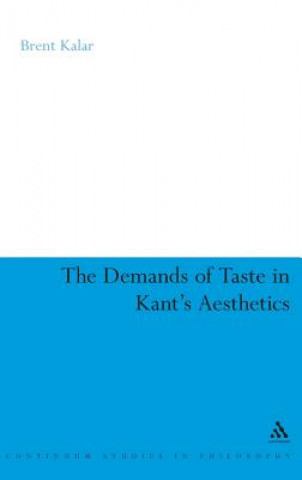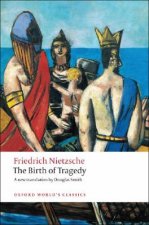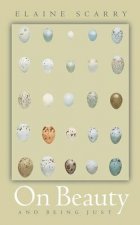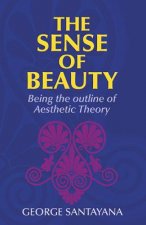
Code: 01253367
Demands of Taste in Kant's Aesthetics
by Brent Kalar
Typically philosophers have either viewed beauty as objective and judgments of beauty as universally valid, or else they have viewed beauty as subjective and regarded judgments of beauty as merely private preferences. Immanuel Kan ... more
- Language:
 English
English - Binding: Hardback
- Number of pages: 192
Publisher: Bloomsbury Publishing, 2006
- More about this

You might also like
-

Consumption in an Age of Information
185.87 €
Give this book as a present today
- Order book and choose Gift Order.
- We will send you book gift voucher at once. You can give it out to anyone.
- Book will be send to donee, nothing more to care about.
More about Demands of Taste in Kant's Aesthetics
You get 698 loyalty points
 Book synopsis
Book synopsis
Typically philosophers have either viewed beauty as objective and judgments of beauty as universally valid, or else they have viewed beauty as subjective and regarded judgments of beauty as merely private preferences. Immanuel Kant is famous for his unique third path. Kant argues that beauty is subjective, but the judgment of taste about beauty is capable of universal validity. In his view, the beautiful is not a feature of objects themselves, but merely represents the way we respond to objects. Furthermore, the judgment of taste about beauty is a merely "aesthetic" judgment - i.e., one based on a feeling of pleasure we take in the object. The judgment of taste, on the other hand, possesses "universal validity": to call something beautiful is implicitly to "demand" that all others find it beautiful as well. Kant's views about the taste for the beautiful have long been the subject of controversy. Scholars have differed over the interpretation of the demand contained in a judgment of taste and whether Kant's attempt to legitimate this demand is successful. Brent Kalar argues that the demands of taste should be understood as involving a uniquely aesthetic normativity rooted in Kant's cognitive psychology. If the basis of aesthetic pleasure in the activity of the cognitive faculties is properly understood, then Kant's attempt to legitimate the demands of taste may be regarded as a success. This leads Kalar to give a new interpretation of the nature of the beautiful according to Kant that re-examines the relationship between "free play" and the "form of purposiveness" in Kant's aesthetics, and restores the "aesthetic ideas" to their rightful centrality in Kant's theory.
 Book details
Book details
Book category Books in English Humanities Philosophy Philosophy: aesthetics
277.75 €
- Full title: Demands of Taste in Kant's Aesthetics
- Author: Brent Kalar
- Language:
 English
English - Binding: Hardback
- Number of pages: 192
- EAN: 9780826488909
- ISBN: 0826488900
- ID: 01253367
- Publisher: Bloomsbury Publishing
- Weight: 428 g
- Dimensions: 236 × 163 × 20 mm
- Date of publishing: 15. October 2006
Trending among others
-

Green
37.93 € -6 % -

Birth of Tragedy
9.85 € -18 % -

In Praise of Shadows
7.94 € -27 % -

Aesthetics of Disappearance
13.78 € -19 % -

Reclaiming Art in the Age of Artifice
15.09 € -18 % -

Ornament and Crime
10.25 € -28 % -

Shop Class as Soulcraft
16.19 € -10 % -

In Praise of Shadows
13.27 € -28 % -

On Ugliness
34.31 € -18 % -

Art of M&A Due Diligence
129.01 € -

On Beauty and Being Just
18.31 € -12 % -

Entrepreneur's Guide to Customer Development
19.61 € -1 % -

Historical-critical Introduction to the Philosophy of Mythology
30.08 € -15 % -

Art of the Modern Age
33.20 € -37 % -

On the Aesthetic Education of Man
10.96 € -28 % -

Art and Objects
22.33 € -13 % -

Divine Beauty
10.25 € -28 % -

Cultural Appropriation and the Arts
44.37 € -2 % -

Birth of Tragedy and The Case of Wagner
10.56 € -25 % -

Sacred Path of Love
16.90 € -34 % -

Anti-aesthetic
25.35 € -

Sense of Beauty
9.95 € -24 % -

Nail It Then Scale It
24.04 € -6 % -

Perfect Me
29.07 € -2 % -

Heidegger's Philosophy of Art
31.59 € -

Only a Promise of Happiness
25.25 € -2 % -

Saving Beauty
13.37 € -

Future of the Image
13.48 € -36 % -

Meaning of the Creative Act
22.43 € -2 % -

Wabi Sabi
7.74 € -23 % -

Aesthetics of Everyday Life
39.94 € -

Speculative Aesthetics
11.26 € -20 % -

On the Aesthetic Education of Man
12.77 € -28 % -

Digital Humanities and Digital Media
20.52 € -2 % -

Aesthetics of Everyday Life
40.95 € -38 % -

Birth of Novalis
118.34 € -

Aesthetic Dimension
25.75 € -8 % -

Working Aesthetics
32.80 € -10 % -

Blackwell Guide to Aesthetics
62.59 € -2 % -

Act of Reading
38.03 € -

Althusser and Art - Political and Aesthetic Theory
12.57 € -5 % -

Interpassivity
20.32 € -19 % -

Writing Art History
47.79 € -

Art of Videogames
35.82 € -2 % -

Art of Videogames
89.35 € -1 % -

How to Make Money Online
7.14 € -2 % -

Feeling Beauty
47.79 € -

Art of M&A Structuring
58.16 € -20 % -

Aesthetics and Ethics
45.68 €
Collection points Bratislava a 2642 dalších
Copyright ©2008-24 najlacnejsie-knihy.sk All rights reservedPrivacyCookies



 15549 collection points
15549 collection points Delivery 2.99 €
Delivery 2.99 € 02/210 210 99 (8-15.30h)
02/210 210 99 (8-15.30h)